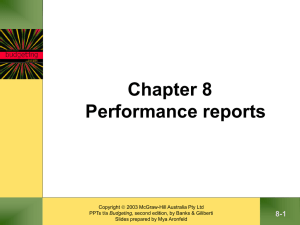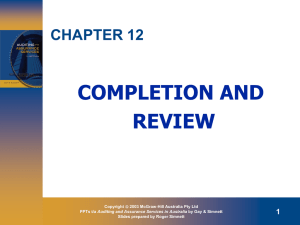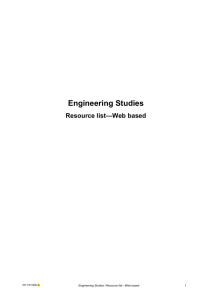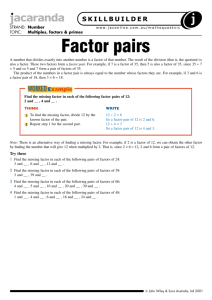Chapter 9
advertisement
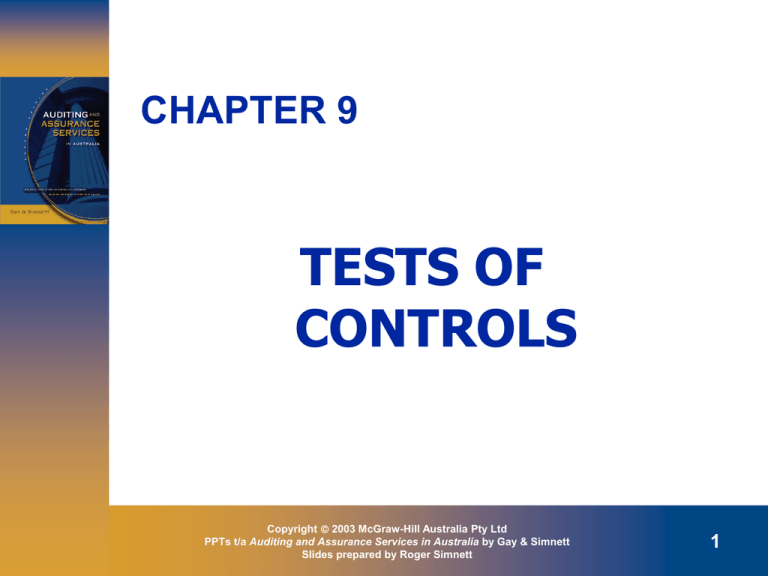
CHAPTER 9 TESTS OF CONTROLS Copyright 2003 McGraw-Hill Australia Pty Ltd PPTs t/a Auditing and Assurance Services in Australia by Gay & Simnett Slides prepared by Roger Simnett 1 TESTS OF CONTROLS • Provide auditor with evidence to support their assessment of control risk. When control risk assessed at less than high, necessary to gather evidence that controls are working. • Auditor will select most efficient and effective combination of tests of controls, and substantive tests of transactions and balances. • Auditor must consider: Design Operation of internal control structure Copyright 2003 McGraw-Hill Australia Pty Ltd PPTs t/a Auditing and Assurance Services in Australia by Gay & Simnett Slides prepared by Roger Simnett 2 PLANNING THE SCOPE OF TESTS OF CONTROLS • Nature: If controls exist that auditor expects to rely upon, undertake tests of these controls, otherwise undertake substantive testing. • Timing: To aid ability to meet deadlines and scheduling of staff, tests of controls sometimes scheduled before year-end. Testing then extended (rolled forward) until year-end. • Extent: For tests of controls related to documents, extent determined by reference to sampling theory. Controls related to accounting routines (e.g. back reconciliations) usually tested by reperforming a small number. Copyright 2003 McGraw-Hill Australia Pty Ltd PPTs t/a Auditing and Assurance Services in Australia by Gay & Simnett Slides prepared by Roger Simnett 3 TESTS OF CONTROLS AIMED AT DESIGN Generally include: • Inquiries of company personnel • Inspection of documents and reports • Observation of the application of specific internal control policies and procedures Copyright 2003 McGraw-Hill Australia Pty Ltd PPTs t/a Auditing and Assurance Services in Australia by Gay & Simnett Slides prepared by Roger Simnett 4 TESTS OF CONTROLS AIMED AT OPERATION Should provide evidence that the: • Control actually existed • Control was effective in achieving its objectives • Control operated continuously throughout the period of intended reliance Copyright 2003 McGraw-Hill Australia Pty Ltd PPTs t/a Auditing and Assurance Services in Australia by Gay & Simnett Slides prepared by Roger Simnett 5 SUFFICIENCY AND APPROPRIATENESS OF TESTS OF CONTROLS • Dependent on level of control risk the tests must support • The lower the planned assessed level of control risk, the greater the amount of testing that is required Copyright 2003 McGraw-Hill Australia Pty Ltd PPTs t/a Auditing and Assurance Services in Australia by Gay & Simnett Slides prepared by Roger Simnett 6 OTHER FACTORS AFFECTING SUFFICIENCY AND APPROPRIATENESS Auditor should also consider: • Type and source evidence • Timeliness • Interrelationship of evidence Copyright 2003 McGraw-Hill Australia Pty Ltd PPTs t/a Auditing and Assurance Services in Australia by Gay & Simnett Slides prepared by Roger Simnett 7 EFFECT OF DOCUMENTATION OF CONTROLS: AUDIT TRAIL • Methods used by auditor dependent on whether a documentary audit trail exists • Where no audit trail exists, greater emphasis on: Observation Inquiry of the control • If audit trail does exist: Inspect documentation for evidence of the control Copyright 2003 McGraw-Hill Australia Pty Ltd PPTs t/a Auditing and Assurance Services in Australia by Gay & Simnett Slides prepared by Roger Simnett 8 REVENUES, RECEIVABLES AND RECEIPTS (SALES CYCLE) Sales cycle involves all those transactions and events that are initiated when an entity makes a sale. Characterised by a high volume of routine transactions. Audit problems tend to be related to clerical processing rather than complex accounting problems. Copyright 2003 McGraw-Hill Australia Pty Ltd PPTs t/a Auditing and Assurance Services in Australia by Gay & Simnett Slides prepared by Roger Simnett 9 KEY FUNCTIONS IN TYPICAL SALES CYCLE • Order entry and order approval by credit department • Shipping • Invoicing • General ledger entry • Accounts receivable • Mail opening • Cashier functions Copyright 2003 McGraw-Hill Australia Pty Ltd PPTs t/a Auditing and Assurance Services in Australia by Gay & Simnett Slides prepared by Roger Simnett 10 TYPICAL CREDIT SALES FLOWCHART Copyright 2003 McGraw-Hill Australia Pty Ltd PPTs t/a Auditing and Assurance Services in Australia by Gay & Simnett Slides prepared by Roger Simnett 11 TYPICAL CASH COLLECTION FLOWCHART Copyright 2003 McGraw-Hill Australia Pty Ltd PPTs t/a Auditing and Assurance Services in Australia by Gay & Simnett Slides prepared by Roger Simnett 12 SALES CYCLE — ROUTINE AND NON-ROUTINE TRANSACTIONS • Routine transactions: credit sales to customers, cash collections from customers (flowcharts), usually strong control system, auditor considers (and usually undertakes) tests of controls. • Non-routine transactions: adjustments to sales, and provisions for doubtful debts. Less well controlled. Where material, auditor undertakes substantive testing. Copyright 2003 McGraw-Hill Australia Pty Ltd PPTs t/a Auditing and Assurance Services in Australia by Gay & Simnett Slides prepared by Roger Simnett 13 CONTROL OBJECTIVES FOR SALES SYSTEM Controls are in place to ensure that: • All sales recorded are bona fide transactions for merchandise actually shipped to customers. • All sales for the period of merchandise shipped are invoiced and properly recorded in accounting records. • Invoices have been recorded correctly as to amount and period and summarised correctly. • Sales are disclosed and classified in accordance with disclosure policies. From Table 9.4 (p. 397) Copyright 2003 McGraw-Hill Australia Pty Ltd PPTs t/a Auditing and Assurance Services in Australia by Gay & Simnett Slides prepared by Roger Simnett 14 EXAMPLE OF LINKING OBJECTIVES TO CONTROL POLICIES AND TESTS OF CONTROLS FOR SALES (From Table 9.4 p. 397) Special control objectives • All sales recorded are bona fide transactions for merchandise actually shipped to customers Common control policies and procedures • Policy of authorisation of credit and terms • Quantities shipped periodically reconciled to quantities invoiced independently of shipping and invoicing • Monthly statements mailed to customers • Signed acknowledgment that goods are received by customers Tests of controls • Select a sample of sales transactions from sales journal (daily activity report), check for appropriate authorisation and trace to shipping document file • Inspect reconciliation of shipments to invoices • Observe mailing of monthly statements, examine customer correspondence file and investigate non-cash credits to accounts receivable Copyright 2003 McGraw-Hill Australia Pty Ltd PPTs t/a Auditing and Assurance Services in Australia by Gay & Simnett Slides prepared by Roger Simnett 15 CONTROL OBJECTIVES FOR CASH RECEIPTS SYSTEM Controls are in place to ensure that: • Recorded cash receipts are for collection of receivables from customers • All cash receipts are recorded and deposited • Cash receipts have been recorded correctly as to account, amount and period Ref.: Table 9.5 (p. 400) Copyright 2003 McGraw-Hill Australia Pty Ltd PPTs t/a Auditing and Assurance Services in Australia by Gay & Simnett Slides prepared by Roger Simnett 16 EXAMPLE OF LINKING CONTROL OBJECTIVES TO CONTROL POLICIES TO TESTS OF CONTROLS: CASH RECEIPTS (Ref.: Table 9.5 p. 400) Special control objectives Common control policies and procedures • Recorded cash receipts are for collection of receivables from customers • Cash receipts matched to specific sales invoices in posting to accounts receivable master file Test of controls • Select a sample of entries in cash receipts journal and trace to remittance advices or sales invoices Copyright 2003 McGraw-Hill Australia Pty Ltd PPTs t/a Auditing and Assurance Services in Australia by Gay & Simnett Slides prepared by Roger Simnett 17 TYPES OF MISSTATEMENTS IN SALES CYCLE Generally result of: • Clerical mistakes • Employee fraud • Misapplied accounting principles • Management fraud Copyright 2003 McGraw-Hill Australia Pty Ltd PPTs t/a Auditing and Assurance Services in Australia by Gay & Simnett Slides prepared by Roger Simnett 18 EXPENDITURES, PAYABLES AND DISBURSEMENTS • Expenditures cycle — all transactions and events initiated when an entity acquires assets or services used for cash or credit. • Auditors (and many entities) often separate this cycle into a number of sub-cycles, which reflect various types of services and assets that can be acquired. Copyright 2003 McGraw-Hill Australia Pty Ltd PPTs t/a Auditing and Assurance Services in Australia by Gay & Simnett Slides prepared by Roger Simnett 19 SUB-CYCLES IN EXPENDITURES, PAYABLES AND DISBURSEMENTS These sub-cycles are: • • • • • Payroll Property, plant and equipment Inventory Income taxes Incurrence of selling and administrative expenses • Miscellaneous expenses paid from petty cash Copyright 2003 McGraw-Hill Australia Pty Ltd PPTs t/a Auditing and Assurance Services in Australia by Gay & Simnett Slides prepared by Roger Simnett 20 KEY FUNCTIONS WITHIN THE INVENTORY SUBCYCLE • Purchasing • Accounts payable • Cash disbursements function Copyright 2003 McGraw-Hill Australia Pty Ltd PPTs t/a Auditing and Assurance Services in Australia by Gay & Simnett Slides prepared by Roger Simnett 21 TYPICAL PURCHASES AND CASH PAYMENTS FLOWCHART Copyright 2003 McGraw-Hill Australia Pty Ltd PPTs t/a Auditing and Assurance Services in Australia by Gay & Simnett Slides prepared by Roger Simnett 22 CONTROL OBJECTIVES IN A PURCHASES OF INVENTORY SYSTEM Controls are in place to ensure that: • All recorded purchases are bona fide transactions in that they relate to goods or services authorised or received. • All purchases for the period of inventory received are recorded. • Purchases of goods or services for inventory are recorded correctly as to account, amount and period, and summarised correctly. • Purchases are disclosed and classified in accordance with disclosure policies. From Table 9.6 (p. 409) Copyright 2003 McGraw-Hill Australia Pty Ltd PPTs t/a Auditing and Assurance Services in Australia by Gay & Simnett Slides prepared by Roger Simnett 23 EXAMPLE OF LINKING CONTROL OBJECTIVES, CONTROLS AND TESTS OF CONTROLS: PURCHASES Special control objectives Common control policies and procedures Tests of controls • All recorded purchases are bona fide transactions in that they relate to goods or services authorised or received • Goods received are counted, inspected and compared to purchase order before acceptance • Services received are acknowledged in writing • Comparison of purchase order, receiving report and supplier’s invoice and recomputation of supplier’s invoice before recording liability • Select a sample of order entries in purchases journal, trace back to vouchers and inspect for existence of supporting document including receiving report, ensuring agreement of details and indication of approval • Observe and inquire about receiving procedures From Table 9.6 (p. 409) Copyright 2003 McGraw-Hill Australia Pty Ltd PPTs t/a Auditing and Assurance Services in Australia by Gay & Simnett Slides prepared by Roger Simnett 24 CONTROL OBJECTIVES IN A CASH DISBURSEMENTS SYSTEM Controls are in place to ensure that: • Recorded cash disbursements are for goods or services authorised and received. • All cash disbursements are recorded. • Cash disbursements are recorded correctly as to account, amount and period. From Table 9.7 (p. 410) Copyright 2003 McGraw-Hill Australia Pty Ltd PPTs t/a Auditing and Assurance Services in Australia by Gay & Simnett Slides prepared by Roger Simnett 25 EXAMPLE OF LINKING CONTROL OBJECTIVES, CONTROL AND TESTS OF CONTROLS: CASH DISBURSEMENTS (Ref.: Table 9.7 p. 410) Special control objectives • Recorded cash disbursements are for goods or services authorised and received Common control policies and procedures Tests of controls • Cheques printed or prepared only when supporting documents compared, recomputed and voucher approved • Cheques signed only after viewing supporting documentation and prior approval • Cheque signing independent of initiating or approving purchases, cheque preparation and accounting functions • Supporting documentation cancelled and reference to cheque number • Select a sample of cash disbursement transactions from cash payments journal and inspect supporting documentation for indication of checking, review and approval, and reperform checking • Observe and inquire about cheque preparation and signing and protection of unissued cheques • For the sample of cash disbursement transactions inspect supporting documents for cancellation, cheque number and endorsement Copyright 2003 McGraw-Hill Australia Pty Ltd PPTs t/a Auditing and Assurance Services in Australia by Gay & Simnett Slides prepared by Roger Simnett 26 POTENTIAL MISSTATEMENTS IN EXPENDITURE CYCLE As expenditure cycle involves disbursements of cash there is a greater risk of fraud or irregularity, including: • • • • • Classic disbursements fraud Kickbacks Illegal acts Unauthorised executive perks Kiting Copyright 2003 McGraw-Hill Australia Pty Ltd PPTs t/a Auditing and Assurance Services in Australia by Gay & Simnett Slides prepared by Roger Simnett 27 SELLING AND ADMINISTRATIVE EXPENSES • Processing and related control policies and procedures for selling and administrative expenses are similar to those for purchases of inventory. • Auditor will normally obtain comfort from cash disbursement testing for inventory purchases and perform minimal testing in this area. • Analytical procedures (e.g. comparing balance with prior periods) widely used as a key type of testing. Copyright 2003 McGraw-Hill Australia Pty Ltd PPTs t/a Auditing and Assurance Services in Australia by Gay & Simnett Slides prepared by Roger Simnett 28 PETTY CASH DISBURSEMENTS • Petty cash disbursements are usually immaterial in amount and therefore few, if any, audit procedures are applied to this area. • Where the area is significant, emphasis is on ensuring appropriate procedures are in place to safeguard cash. Copyright 2003 McGraw-Hill Australia Pty Ltd PPTs t/a Auditing and Assurance Services in Australia by Gay & Simnett Slides prepared by Roger Simnett 29 PAYROLL The payroll function is usually audited in either of two ways (or best combination): • Focusing on analytical procedures (there are disaggregated and strong relationships in this area, e.g. comparing fortnightly payrolls); or • An emphasis on tests of transactions over the payroll area with a key control being appropriate segregation of duties of hiring function, approval of time worked, payroll preparation and payroll distribution. Copyright 2003 McGraw-Hill Australia Pty Ltd PPTs t/a Auditing and Assurance Services in Australia by Gay & Simnett Slides prepared by Roger Simnett 30 TESTS OF CONTROLS IN PAYROLL If tests of controls are necessary the following audit procedures may be undertaken: • Authorisation by supervisors of time worked • Check signed time cards/sheets • Use of approved pay rates (personnel department) • Check for reasonableness, compared with awards Copyright 2003 McGraw-Hill Australia Pty Ltd PPTs t/a Auditing and Assurance Services in Australia by Gay & Simnett Slides prepared by Roger Simnett 31 INTEREST, RENT, LEASE AND INSURANCE PAYMENTS Usually a substantive approach of checking terms and conditions to contracts. • Auditor interested in the key control of authorisation of the contract • Accounting treatment of leases complex, and auditor might check controls to ensure properly accounted for Copyright 2003 McGraw-Hill Australia Pty Ltd PPTs t/a Auditing and Assurance Services in Australia by Gay & Simnett Slides prepared by Roger Simnett 32 TESTING CONTROLS IN CLIENT COMPUTER PROGRAMS Separate techniques have to be developed for testing programmed controls. These are: • Test data • Integrated test facility • Controlled processing, reprocessing or parallel processing • Review program code and results of job processing Copyright 2003 McGraw-Hill Australia Pty Ltd PPTs t/a Auditing and Assurance Services in Australia by Gay & Simnett Slides prepared by Roger Simnett 33 TEST DATA Figure 9.4 (p. 416) Copyright 2003 McGraw-Hill Australia Pty Ltd PPTs t/a Auditing and Assurance Services in Australia by Gay & Simnett Slides prepared by Roger Simnett 34 INTEGRATED TEST FACILITY Figure 9.5 (p.417) Copyright 2003 McGraw-Hill Australia Pty Ltd PPTs t/a Auditing and Assurance Services in Australia by Gay & Simnett Slides prepared by Roger Simnett 35 AUDITING THROUGH COMPUTER — PROCESSING CLIENT DATA • Controlled processing. Auditor establishes control over processing of client’s data. • Controlled reprocessing. Auditor reprocesses client data. • Parallel processing. Simultaneously processes client data through client and auditor programs. Copyright 2003 McGraw-Hill Australia Pty Ltd PPTs t/a Auditing and Assurance Services in Australia by Gay & Simnett Slides prepared by Roger Simnett 36 AUDITING THROUGH COMPUTER — NON-PROCESSING APPROACHES • Program code review. Involves reviewing relevant code line by line, considering whether processing steps and control procedures are properly coded and logically correct. • Review of job accounting data. Involves review printed log of jobs, looking for excessive processing time, abnormal halts, etc. Copyright 2003 McGraw-Hill Australia Pty Ltd PPTs t/a Auditing and Assurance Services in Australia by Gay & Simnett Slides prepared by Roger Simnett 37 ADVANCED CAATs • Systems control audit review file (SCARF) Audit modules embedded in programs to monitor transaction activity • Snapshot Transactions are tagged and then identified at certain points during processing to see how program is treating them • Audit hooks Points in program that allow auditor to insert commands for special processing Copyright 2003 McGraw-Hill Australia Pty Ltd PPTs t/a Auditing and Assurance Services in Australia by Gay & Simnett Slides prepared by Roger Simnett 38 IMPACT OF STRATEGIC BUSINESS RISK ON TESTS OF CONTROLS Approach increases emphasis on nonroutine transactions and decreases emphasis on routine transactions: • Expect a satisfactory IC structure around routine transactions; therefore must undertake tests of controls to support this expectation • Therefore either no change or increased emphasis on tests of controls Copyright 2003 McGraw-Hill Australia Pty Ltd PPTs t/a Auditing and Assurance Services in Australia by Gay & Simnett Slides prepared by Roger Simnett 39


